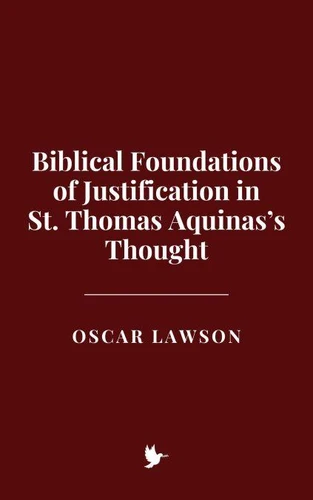Biblical Foundations of Justification in St. Thomas Aquinas’s Thought
Par :Formats :
Disponible dans votre compte client Decitre ou Furet du Nord dès validation de votre commande. Le format ePub est :
- Compatible avec une lecture sur My Vivlio (smartphone, tablette, ordinateur)
- Compatible avec une lecture sur liseuses Vivlio
- Pour les liseuses autres que Vivlio, vous devez utiliser le logiciel Adobe Digital Edition. Non compatible avec la lecture sur les liseuses Kindle, Remarkable et Sony
 , qui est-ce ?
, qui est-ce ?Notre partenaire de plateforme de lecture numérique où vous retrouverez l'ensemble de vos ebooks gratuitement
Pour en savoir plus sur nos ebooks, consultez notre aide en ligne ici
- FormatePub
- ISBN8231325412
- EAN9798231325412
- Date de parution25/06/2025
- Protection num.pas de protection
- Infos supplémentairesepub
- ÉditeurWalzone Press
Résumé
This definitive exploration unveils the profound biblical roots underpinning St. Thomas Aquinas's doctrine of justification-the transformative process through which sinners are made righteous before God. Grounded in a meticulous analysis of key scriptural texts, especially the letters of Paul, and enriched by the wisdom of the early Church Fathers, this book reveals how Aquinas masterfully integrates biblical anthropology and soteriology within his enduring theological synthesis.
Delving into Aquinas's use of Scripture, this work illuminates his nuanced understanding of grace as a gratuitous divine gift, faith as the living instrument of justification, and charity as the form that perfects it. From the cleansing waters of baptism to the empowering work of the Holy Spirit, the book traces how biblical revelation shapes Aquinas's vision of salvation as a dynamic journey, culminating in the eschatological hope of the beatific vision.
Beyond rigorous theological scholarship, the book addresses historical controversies and clarifies misunderstandings that have shaped debates on justification across centuries. It offers readers a rich dialogue between medieval scholasticism and biblical theology, highlighting Aquinas's relevance for contemporary Christian thought, ecumenical conversations, and spiritual life. Ideal for theologians, students, clergy, and thoughtful readers seeking a deep yet accessible engagement with one of Christianity's foundational doctrines, this book bridges ancient Scripture and medieval wisdom to illuminate how grace, faith, and works converge in the transformative power of justification.
Delving into Aquinas's use of Scripture, this work illuminates his nuanced understanding of grace as a gratuitous divine gift, faith as the living instrument of justification, and charity as the form that perfects it. From the cleansing waters of baptism to the empowering work of the Holy Spirit, the book traces how biblical revelation shapes Aquinas's vision of salvation as a dynamic journey, culminating in the eschatological hope of the beatific vision.
Beyond rigorous theological scholarship, the book addresses historical controversies and clarifies misunderstandings that have shaped debates on justification across centuries. It offers readers a rich dialogue between medieval scholasticism and biblical theology, highlighting Aquinas's relevance for contemporary Christian thought, ecumenical conversations, and spiritual life. Ideal for theologians, students, clergy, and thoughtful readers seeking a deep yet accessible engagement with one of Christianity's foundational doctrines, this book bridges ancient Scripture and medieval wisdom to illuminate how grace, faith, and works converge in the transformative power of justification.
This definitive exploration unveils the profound biblical roots underpinning St. Thomas Aquinas's doctrine of justification-the transformative process through which sinners are made righteous before God. Grounded in a meticulous analysis of key scriptural texts, especially the letters of Paul, and enriched by the wisdom of the early Church Fathers, this book reveals how Aquinas masterfully integrates biblical anthropology and soteriology within his enduring theological synthesis.
Delving into Aquinas's use of Scripture, this work illuminates his nuanced understanding of grace as a gratuitous divine gift, faith as the living instrument of justification, and charity as the form that perfects it. From the cleansing waters of baptism to the empowering work of the Holy Spirit, the book traces how biblical revelation shapes Aquinas's vision of salvation as a dynamic journey, culminating in the eschatological hope of the beatific vision.
Beyond rigorous theological scholarship, the book addresses historical controversies and clarifies misunderstandings that have shaped debates on justification across centuries. It offers readers a rich dialogue between medieval scholasticism and biblical theology, highlighting Aquinas's relevance for contemporary Christian thought, ecumenical conversations, and spiritual life. Ideal for theologians, students, clergy, and thoughtful readers seeking a deep yet accessible engagement with one of Christianity's foundational doctrines, this book bridges ancient Scripture and medieval wisdom to illuminate how grace, faith, and works converge in the transformative power of justification.
Delving into Aquinas's use of Scripture, this work illuminates his nuanced understanding of grace as a gratuitous divine gift, faith as the living instrument of justification, and charity as the form that perfects it. From the cleansing waters of baptism to the empowering work of the Holy Spirit, the book traces how biblical revelation shapes Aquinas's vision of salvation as a dynamic journey, culminating in the eschatological hope of the beatific vision.
Beyond rigorous theological scholarship, the book addresses historical controversies and clarifies misunderstandings that have shaped debates on justification across centuries. It offers readers a rich dialogue between medieval scholasticism and biblical theology, highlighting Aquinas's relevance for contemporary Christian thought, ecumenical conversations, and spiritual life. Ideal for theologians, students, clergy, and thoughtful readers seeking a deep yet accessible engagement with one of Christianity's foundational doctrines, this book bridges ancient Scripture and medieval wisdom to illuminate how grace, faith, and works converge in the transformative power of justification.

















